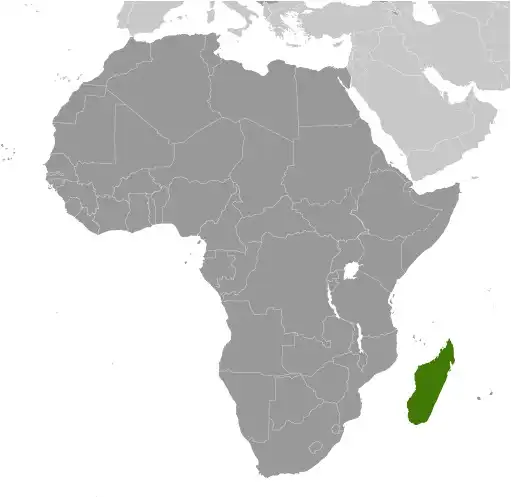
Madagascar Country Profile
Key Facts of Madagascar

| Government type: | semi-presidential republic |
| Capital: | Antananarivo |
| Languages: | Malagasy (official) 99.9%, French (official) 23.6%, English 8.2%, other 0.6% (2018 est.) |
Madagascar Demographic Data
Ethnic Groups in Madagascar(mixed African, Malayo-Indonesian, and Arab ancestry - Betsimisaraka, Tsimihety, Antaisaka, Sakalava)
Religious Groups in Madagascar (2021 est.)
Age pyramid of Madagascar

Madagascar Economy Statistics
Economic overview of Madagascar
low-income East African island economy; natural resource rich; extreme poverty; return of political stability has helped growth; sharp tax revenue drop due to COVID-19; leading vanilla producer; environmentally fragile
Madagascar Real GDP (purchasing power parity) in Billion $
Madagascar Real GDP per capita in $
Madagascar's Exports & Imports in billion $
Top 5 Import Partnerin 2022 (55%) of Madagascar
Top 5 Import Commodities in 2022 of Madagascar
- refined petroleum ⛽
- rice 🍚
- fabric 👕🧶
- palm oil 🛢️
- cotton fabric 🧵
Top 5 Export Partnerin 2022 (61%) of Madagascar
Top 5 Export Commodities in 2022 of Madagascar
- nickel 🪙
- garments 👕
- vanilla 🍦
- cloves 🌿
- cobalt 🪙
Geography of Madagascar
Map of Madagascar

Land and Water Distrubtion of Madagascar
Natural Resources of Madagascar
- graphite ✏️
- chromite 🪨
- coal ⚫
- bauxite 🪨
- rare earth elements 🪨🪙💎
- salt 🧂
- quartz 🪨
- tar sands 🏜️
- semiprecious stones 🪨
- mica 🪨
- fish 🐟
- hydropower 💧⚡
Climate inMadagascar
tropical along coast, temperate inland, arid in south
History of Madagascar - a Summary
Madagascar was one of the last major habitable landmasses on earth to be settled by humans. While there is some evidence of human presence on the island in the millennia B.C., large-scale settlement began between A.D. 350 and 550 with settlers from present-day Indonesia. The island attracted Arab and Persian traders as early as the 7th century, and migrants from Africa arrived around A.D. 1000. Madagascar was a pirate stronghold during the late 17th and early 18th centuries and served as a slave trading center into the 19th century. From the 16th to the late 19th century, a native Merina Kingdom dominated much of Madagascar. The French conquered the island in 1896 and made it a colony; independence was regained in 1960.
Free presidential and National Assembly elections were held in 1992-93, ending 17 years of single-party rule. In 1997, in the second presidential race, Didier RATSIRAKA, the leader during the 1970s and 1980s, returned to the presidency. The 2001 presidential election was contested between the followers of RATSIRAKA and Marc RAVALOMANANA, nearly causing half the country to secede. In 2002, the High Constitutional Court announced RAVALOMANANA the winner. He won a second term in 2006 but, following protests in 2009, handed over power to the military, which then conferred the presidency on the mayor of Antananarivo, Andry RAJOELINA, in what amounted to a coup d'etat. After a lengthy mediation process, Madagascar held UN-supported presidential and parliamentary elections in 2013. Former de facto finance minister Hery RAJAONARIMAMPIANINA won in a runoff and was inaugurated in 2014. In 2019, RAJOELINA was declared the winner against RAVALOMANANA. In 2023, RAJOELINA won another term in an election that most of the opposition boycotted, including RAJAONARIMAMPIANINA and RAVALOMANANA, who claimed it was rigged in favor of RAJOELINA. International observers, however, saw no evidence of systemic fraud, leading the international community to accept the election results.
